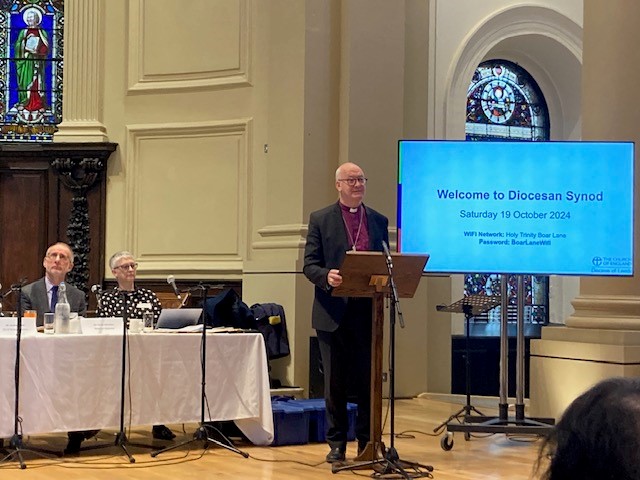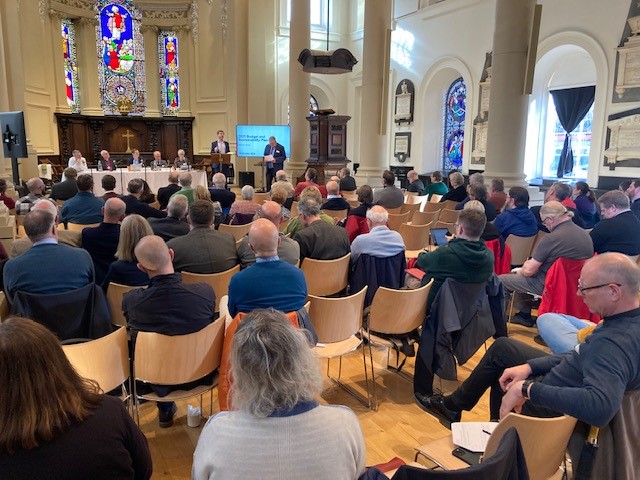 The first Diocesan Synod of the new triennium began with a Eucharist and a welcome to newcomers and all from Bishop Nick, plus his invitation to listen, learn and debate.
The first Diocesan Synod of the new triennium began with a Eucharist and a welcome to newcomers and all from Bishop Nick, plus his invitation to listen, learn and debate.
It was also the first time the event had been held at Holy Trinity, Boar Lane, Leeds and attendance was high for this important gathering of clergy and lay representatives from all our deaneries.
The Rt Revd Nick Baines, Bishop of Leeds urged everyone to be faithful in their approach to the real life matters that would be discussed and to heed the words of others, while always being ready to ask questions and voice opinions.
Bishop Nick’s Presidential Address is below and a full report of proceedings will be on this website on Monday.
Diocese of Leeds
Twenty Ninth Diocesan Synod, Saturday, October 19 2024
Presidential Address
We began this synod with the Eucharist. Not with business or ‘issues’ that preoccupy both church and world. Not with opinions and debating points. Not even with a theological paper or a small-group discussion of doctrinal principle. We began with a Eucharist.
In other words, we began with what is left when you strip away everything else from our cluttered and anxious lives: God the Father sending Jesus the Son in the power of the Holy Spirit to call and empower his people to look, see, think and live differently in the world of God’s creation. So, we prayed and we listened; we read and we sang; we came with empty hands and received what is always gift; and we pledged to leave – later – with hearts and minds renewed, taking the bread of life out into the world. We began with Eucharist: simple, stripped back, grace-fuelled and love-filled remembrance of God’s self-giving for the sake of the world.
We began with gratitude. And we can now move onto our business in the same frame of mind: with gratitude, grace, mercy and love – never confusing the urgent or important business of our common life and mission with that essential Gospel stuff of making the space in which all of us can find that we have been found by God.
Now, this is important. Because when we lose our memory or forget what it is that bring us here – together – then we might as well save our train fares and breath and go home to watch the footie on the telly. (Liverpool vs Chelsea starts at 4.30pm tomorrow afternoon.)
I am not being naïve or spiritualising the business we need to do today; I am simply reminding myself and you of why we bother to do this in the first place. If our business – and the way we do it – takes us away from the heart of our faith and worship, then it has become futile, and we have little or nothing to offer the world around us other than angry assertion, random ideology, or competitive claims for attention.
You might feel that you do not need to be reminded of these priorities; but, I do. So, thank you for patiently listening in while I talk to myself. Although I suspect that I am not alone in getting easily distracted by the stuff of life and politics and media and the million things that annoy me. We come back to worship. And prayer. And listening for the Word of the Lord. And singing – because nothing can stop the Church singing its praises and laments and questions and wonderings.
I remember for the first time hearing Jim Wallis speak about his book ‘The Call to Conversion’ in the mid-1980s (before some of you were born). He described how the Sojourners Community he led in Washington DC was always getting arrested and led to the cells. A policeman once complained to Jim that he and his colleagues were missing them when no arrests had taken place for some time. They missed the singing. Jim Wallis observed that Christians cannot stop singing, regardless of what happens to them or wherever they find themselves.
So, today, at this synod, we have sung. And the echoes of our singing can resonate through our collective thinking and speaking and listening and debating of business.
I say all this having spent much time in recent weeks and months looking into matters of great import in our country and the wider world. You should know that I am conducting an inquiry into the future of Europe, and that this involves meeting many excellent people to see what vision, what new narratives we can develop for helping our children and grandchildren shape their common future in a dangerous and conflicted world. In Brussels a few days ago we met people (including at the European Commission) who reminded us of Jacques Delors’ ‘The Soul of Europe’ project in the 1980s – essentially a reminder that politics are about humanity and that human societies need more than strong economies. People are material, but are considerably more than material.
And this is why the move by one of our MPs, Kim Leadbeater, to introduce a Bill to legalise assisted dying – which some of us insist on calling ‘assisted suicide’ – matters so much. The evidence from other countries where such legislation is already in place is clear: what begins as restricted in scope soon expands. There are already too many examples in Canada, for example, where the slippery slope has clearly been greased.
But, the real problem with it is not primarily ‘religious’ – a word used by proponents to indicate that objections are merely the product of some private kooky dogma and therefore should be dismissed as irrational – but anthropological: is an individual human being totally autonomous, or are human beings fundamentally relational/societal beings whose individual autonomy is necessarily limited by wider obligations. Dr Nick Spencer, Senior Fellow at the Christian thinktank Theos, speaks about ‘Kantian autonomy’ and its inevitable destination in reducing people to material choices. (Obviously, it’s more complicated than that, but you get the idea.)
Given some of the Church’s other preoccupations at the moment, it is worth noting that this matter is far, far more important and urgent than others. So, if you agree with my take on this – and you might not – you might want to add to your MP’s postbox before the debate in the House of Commons takes place shortly. Ask them what constitutes their theological anthropology … then hold your breath while you wait for an answer.
So, today we began with worship and gratitude and I have moved us on to matters of urgency in the wider world. And the truth is that the content and practice of the former should lead us to think deeply about the latter. Which then raises the question of the agenda before us today and why it is shaped the way it is.
A synod is simply a bringing together of Christians to confer, think, pray and deliberate together. We should be open to hearing things – views and perspectives – which take us beyond our own limited thinking and open our minds to what might not be comfortable. The Anglican polity sees what we are doing today as ‘the bishop in synod’, conferring and seeking common (or uncommon) wisdom. It assumes that the bishop is not the fount of all wisdom and needs to look through the eyes of others. It further assumes that clergy alone do not form the substance of the Church of God. It affirms that clergy need laity and laity need clergy, and the bishops need both if all of us are to face reality and make hard decisions together in faith and love.
So, if you are on the synod for the first time, or returning for another run at it, then you are welcome. You must gain the confidence to speak – but also to prioritise listening to others. Run the risk of sounding silly or asking the obvious question that everybody else has forgotten to ask. Look through the lens of you local parochial experience at the wider church and diocese, but allow the perspective of people from other contexts and backgrounds to challenge, encourage and shape your own growing understanding.
This is how I approach any synod. I come to listen and learn – to have my vision deepened and widened. And I come to be advised and guided by the collective wisdom of my brothers and sisters in Christ in this diocese.
Today we will address a motion that urges the wider church to face the need for further financial provision in order to meet ambitious climate goals. This is not easy stuff. It is too easy to demand money from the national church at the same time as not considering what else has to be dropped in order for that money to be available. So, our pleas must be made with a commitment to do our bit at every level. Otherwise, this is just gesture rhetoric.
Later we will have a report from the last General Synod and hear how national debates are going on uncontroversial matters such as human sexuality. And that will be followed by an update on our own diocesan resource project – Barnabas: Encouraging Confidence. And the thread between Carbon Net Zero financing, the General Synod’s agenda and Barnabas? We all need encouragement as well as challenge because none of these issues is easy or straightforward. And they all call for what I call a confident humility as we tread carefully together on sacred territory.
I am very grateful to those willing to serve on our Diocesan Board – giving time, skill, experience and wisdom to the running of ‘the business’ of being a diocese. We will consider the Diocesan Board of Education elections and make decisions. Yet, we know that such bodies involve many people who give freely and sacrificially of their time in order to help us shape our service of thousands of children and families in our region. A debate on FairTrade will lead us into a debate and decision on our diocesan budget for 2025 (which is not far away) – essential and detailed work that emphasises what someone once called ‘theology in numbers’. We will conclude with approval of the Instrument of Delegation from me to the area bishops – a necessary method for keeping us honest and legal and giving clarity of remit as we try to minister to our diocese at every level.
At some point this afternoon we will breathe a sigh of relief and receive the pronouncement of God’s blessing. We will leave with confidence, but with the humility that uncertainties lie ahead of us – that we cannot control the world or God. Our autonomy is limited. But, the God who gave himself to us in Christ is the God who empowers us to do our business with each other and the world around us, confident that this is God’s church, God’s mission and we are God’s people. Again, in the great words of Czech philosopher Jan Patocka, we enjoy the “solidarity of the shaken” and we hold onto our grateful response to a self-giving God as we seek to strip everything back to worship, love and service.
May God bless us as we seek with integrity, diligence and humility to discern his will and his way.
The Rt Revd Nicholas Baines
Bishop of Leeds
19 October 2024
